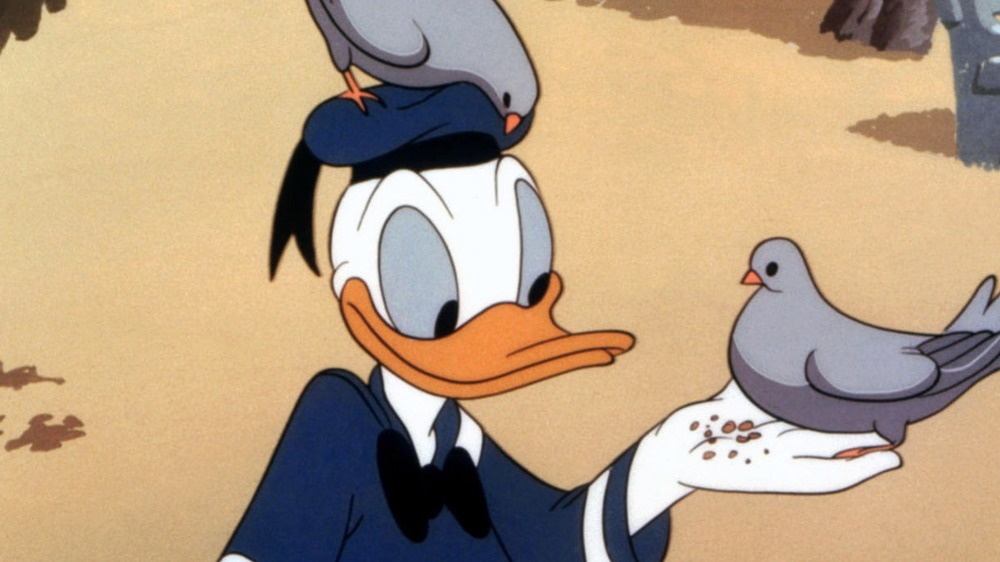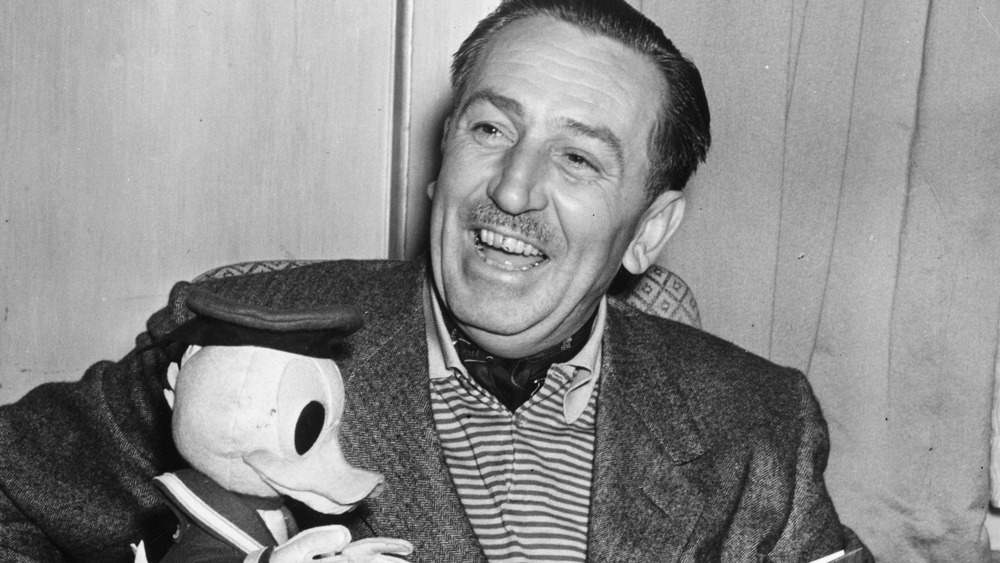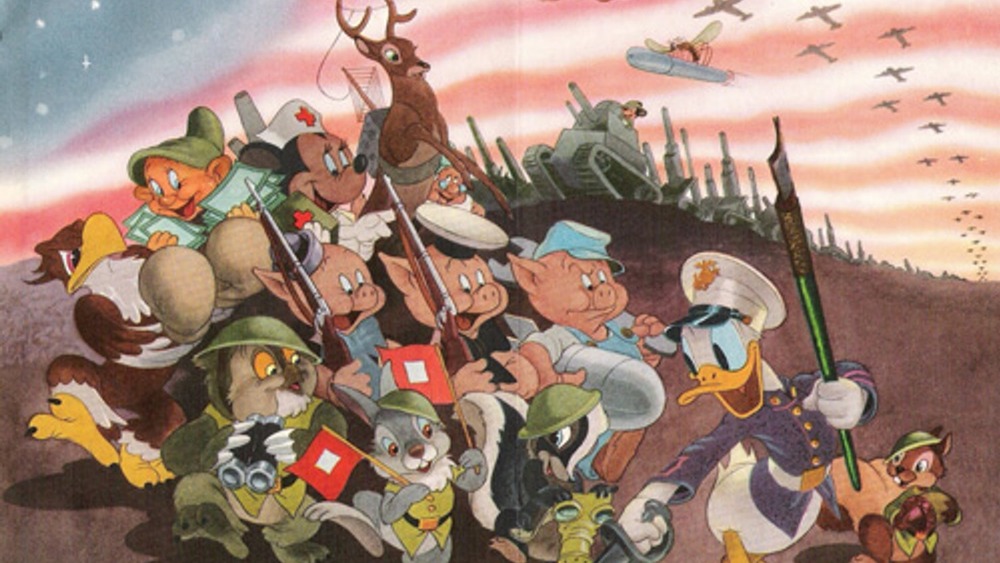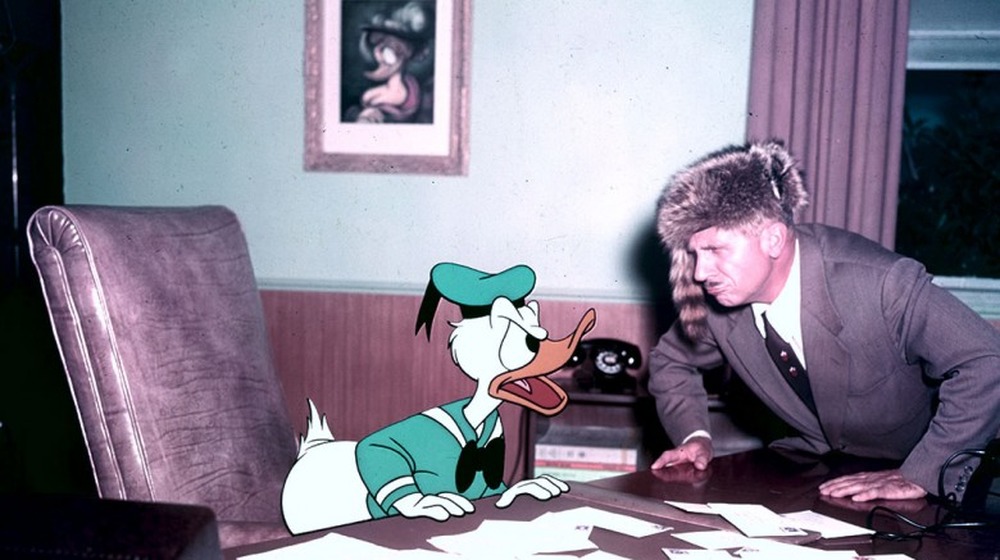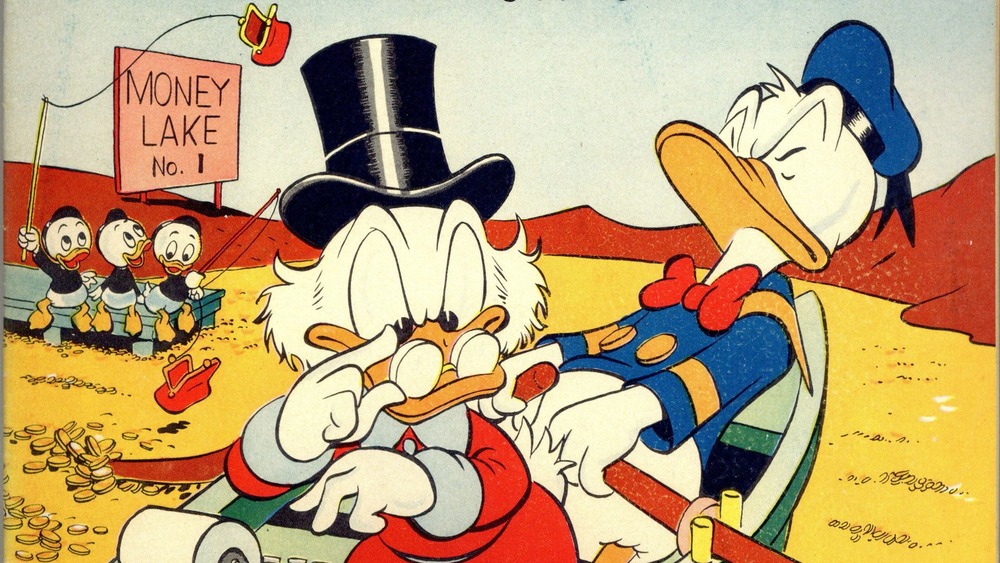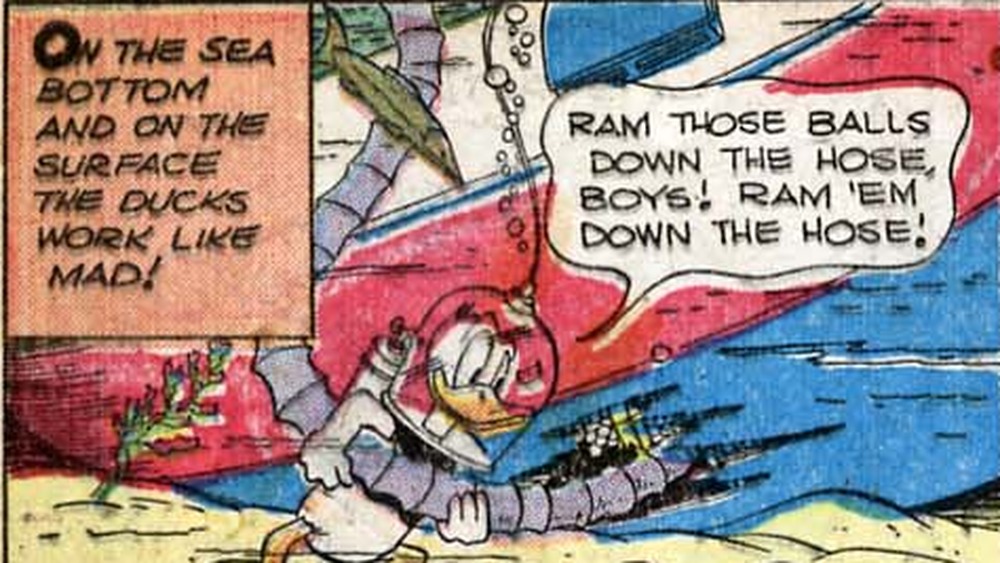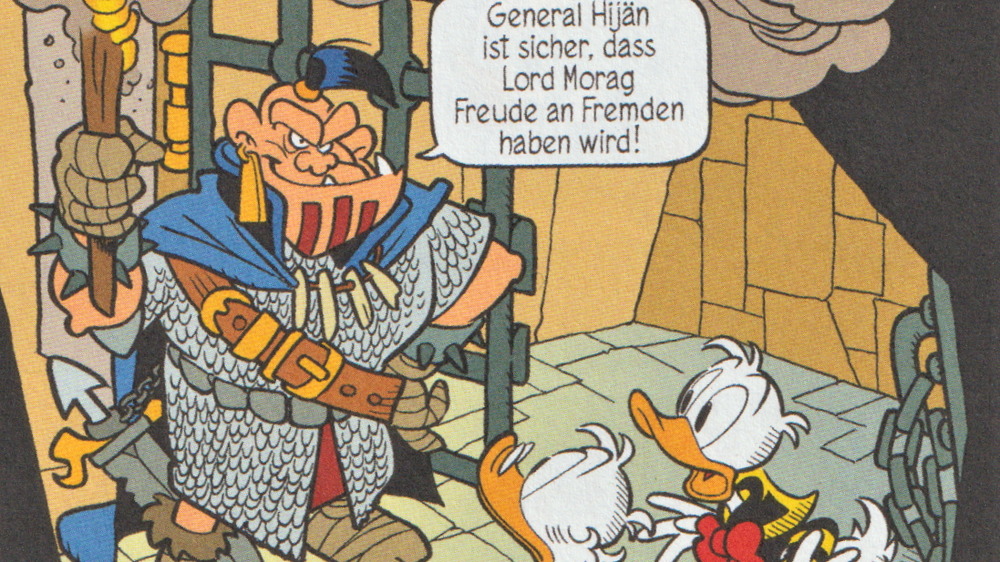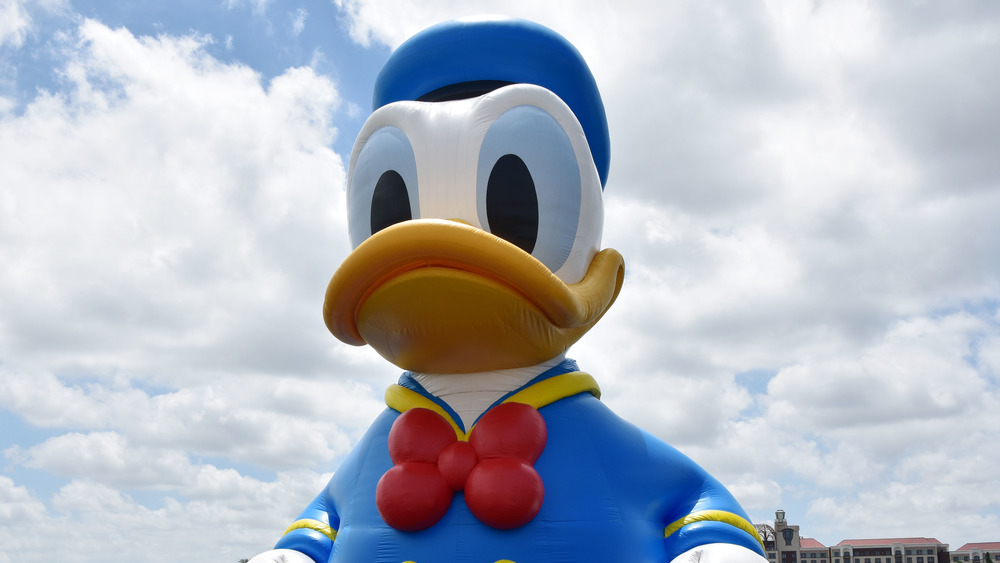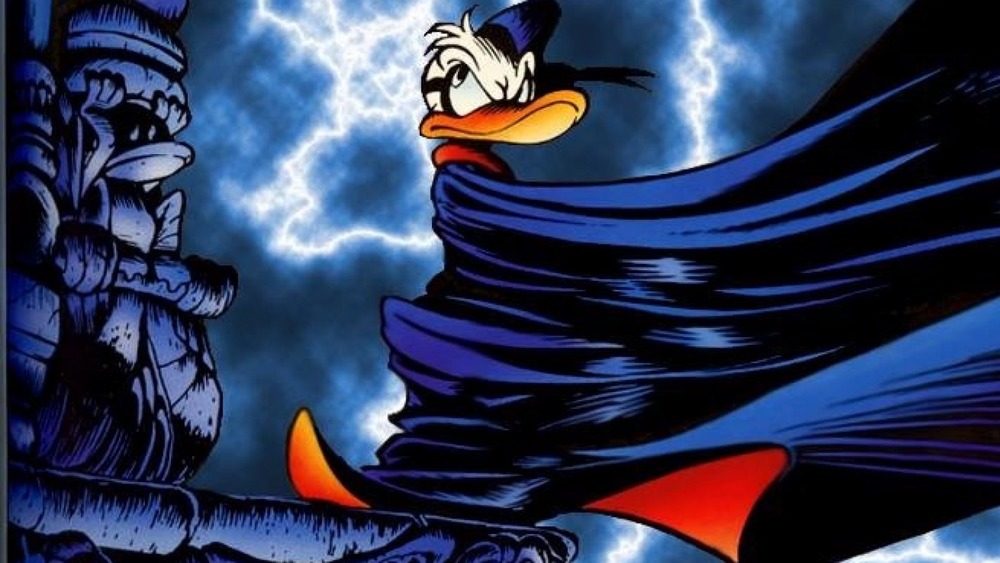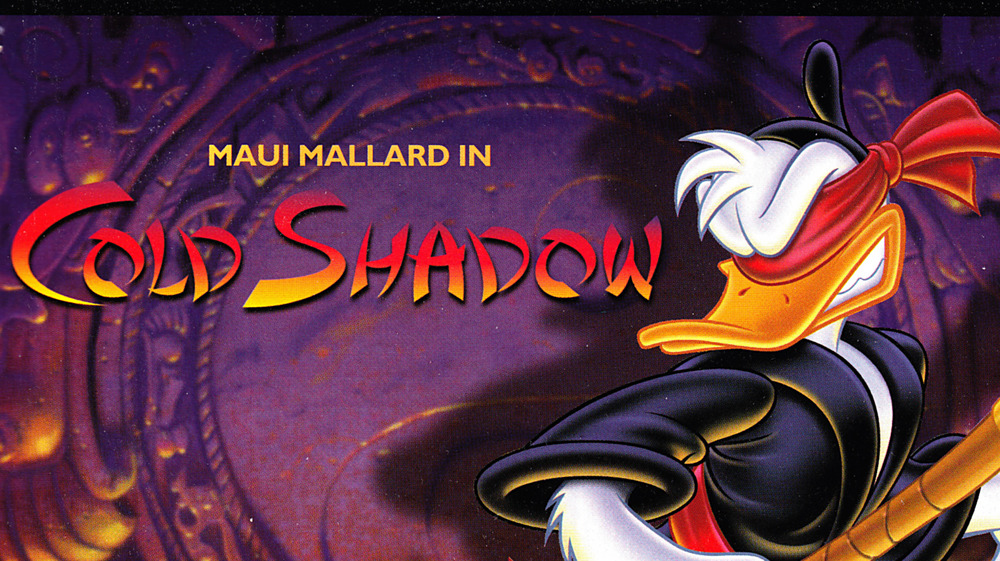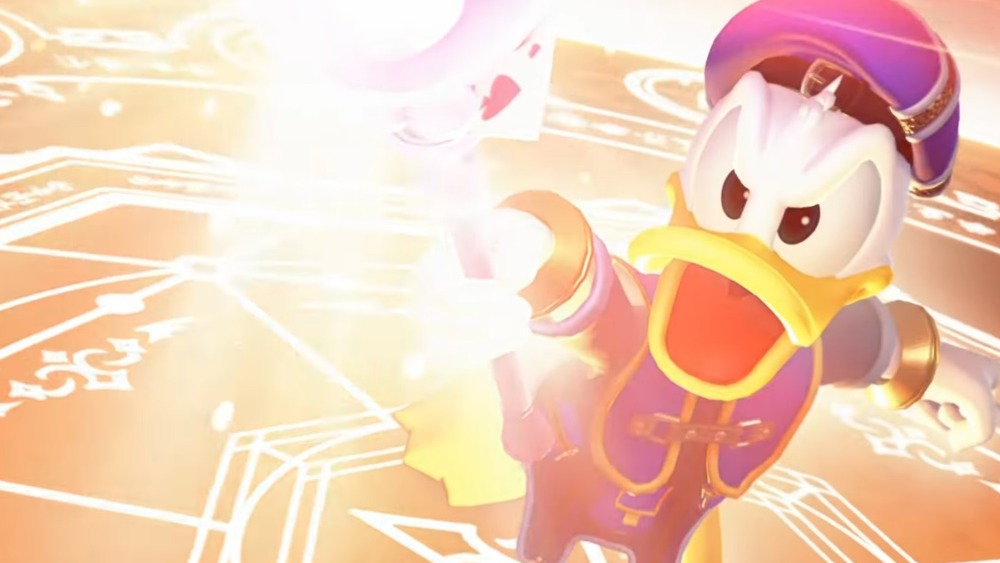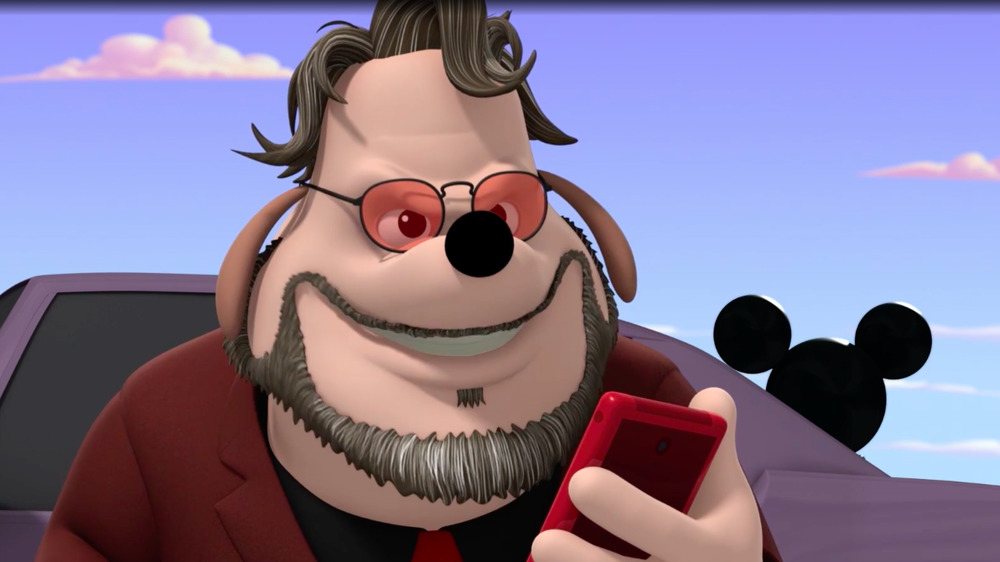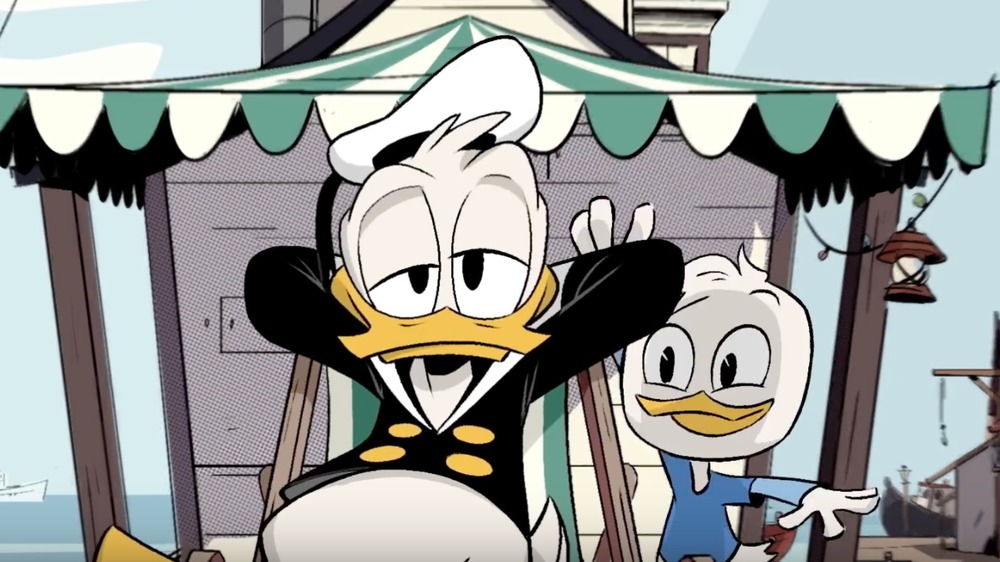The Untold Truth Of Donald Duck
So many pop culture heroes reflect who we want to be, but few reflect who we really are quite as well as Disney's Donald Duck. Immature, constantly irritated by the world around him (and just as often by his own actions), and thrown into a rage at the slightest inconvenience, Donald Duck hits a whole lot closer to home than most of us would like. Ever since he first appeared in Disney's 1934 adaptation of the classic fable, The Wise Little Hen, Donald's been inescapable in theaters, on TV, in video games, in theme parks, in toys, and on every product known to man. He's gone to the moon, sailed on Noah's Ark, and even fought metaphysical shadow monsters – but he still can't win in a struggle with his own car. In his nearly 100 years of existence, the furious fowl has had so many adventures, we could never hope to discuss them all. But we can celebrate the little-know details, stories, and truths you may have missed about Donald Duck.
Donald was originally much bigger than Mickey Mouse
Mickey Mouse is one of the most recognizable characters in the world, and the face of one of its biggest media empires. And yet, Donald immediately stole Mickey's spotlight when they first appeared together in 1934's Orphan's Benefit. By the time the short premiered, Mickey's popularity was becoming a bit of a curse. He was the face of Disney's growing media empire, but that meant everything he did onscreen had to reflect well upon the company. The trouble is, good behavior may be important in real life, but it doesn't make for very funny cartoons.
As Mickey had become less exciting, Donald gave Disney an opportunity to go in the opposite direction, with a character whose whole appeal is based on antisocial behavior. Viewers ate it up, and soon, Donald was a regular part of the cast, tagging along with Mickey and Goofy in classic cartoons like Clock Cleaners and Lonesome Ghosts. By 1936, Donald got a series all his own, beginning with Donald and Pluto. In 1944, he got his own feature film, The Three Caballeros, and quickly appeared in three others: Melody Time, Fun and Fancy Free, and Saludos Amigos. The '40s produced dozens upon dozens of Donald Duck cartoons, while Mickey gained only a paltry few — and most of those have him playing second banana to his own dog!
He fought on both sides in World War II
As Disney's biggest star, Donald was a major part of the studio's contribution to the war effort in the 1940s. He officially joins the army in 1942's Donald Gets Drafted, fights in the Pacific Theater in Commando Duck, and uses some futuristic camouflage to torment Drill Sergeant Pete in The Invisible Private. But one of the strangest and most popular Donald shorts sends him to Nazi Germany. In Der Fuehrer's Face, Donald appears as a German factory worker in full Nazi uniform, in order to satirize Hitler's regime and build American patriotism. The cartoon ends with Donald waking up in flag-patterned pajamas, relieved to realize it was all a dream. He hugs a miniature Statue of Liberty and says, "Am I proud to be a citizen of the United States of America!"
The cartoon was a huge hit, and its theme song became a bestseller for novelty musician Spike Jones. Disney's been less enthused about it lately, though. Partly, this is because of the cartoon's dated historical references, and majorly because of its dated racist stereotypes. But it's also because Disney doesn't want viewers to see their kid-friendly icon saluting pictures of Hitler. Disney kept the short out of circulation for years, except in the limited-edition DVD, Walt Disney Treasures: On the Front Lines. This plan backfired when screenshots of Nazi Donald spread around the internet, looking even worse when divorced from their context as anti-Nazi propaganda.
Donald got in a fight with his own voice
A big part of Donald's success came from Clarence Nash, the man who first played him. Nash mostly stayed offscreen, but he did make one memorable appearance alongside his most famous creation on the Disneyland TV show. The episode, "A Day in the Life of Donald Duck," shows just that, as the animated Donald goes about his business in the live-action Disney studio. This provides an opportunity to showcase some impressive special effects: Donald actually blows real storyboards off the wall, and at one point, he gets his paint washed off with a hose, turning him into a transparent line drawing. That attention to detail is present in smaller ways too — for instance, Donald's office has two doorknobs, one at human height and the other at duck height.
The most memorable moment comes when Donald answers his fan mail and, predictably, throws a fit when one young fan complains she can't understand him. He demands a meeting with his voice, who gets a chance to show off how he performs Donald's voice, along with some other tricks like birdcalls and playing "Who's Afraid of the Big Bad Wolf" by squeezing his hands together. It isn't long before the meeting descends into a shouting match between Clarence Nash and his alter ego. Maybe it's all a philosophical statement on the duality of man? Or duck?
He's a comic book hero
The first appearance of Superman launched a Golden Age of comic books, which became more profitable and widely read than they'd ever been before. Movie studios rushed onto the bandwagon to publish new comic book adventures for their animated stars, and Disney was no exception. It worked out great for them: At one point, Walt Disney's Comics and Stories was the highest-selling comic book in the world.
A lot of that success was due to the work of writer-artist Carl Barks. A former Disney storyboard artist, he earned legions of fans who knew him only as "the good artist," since he wasn't allowed to sign his work. Barks created new kinds of stories to suit the new medium, sending Donald on globetrotting adventures to locations like the Himalayan utopia of Tralla La and the lost Andean city of Plain Awful, where hens lay square eggs. He expanded Donald's universe in ways that Disney still draws on today, most prominently in the new and old DuckTales series. He gave Donald a hometown in Duckburg, Calisota. He introduced supporting characters like the villainous Magica DeSpell, the Beagle Boys, and the zany inventor, Gyro Gearloose. Most memorably, he expanded the Duck family with characters like Donald's cousin Gladstone Gander, who's as lucky as Donald is unlucky, and his fabulously wealthy uncle Scrooge McDuck. Uncle Scrooge was so popular he got his own comic book before he ever appeared onscreen.
A Donald Duck comic blocked a real-life patent
Carl Barks' Donald Duck comics are often outlandish, but generally speaking, they're fairly grounded in reality. Barks liked to find plausible solutions to the many implausible situations Donald finds himself in — some of which have even been proven to work in real life. In 1964, the freighter Al Kuwait sank in a Kuwaiti harbor. The ship's decomposing cargo threatened to contaminate the region's drinking water before a crane could lift it out, so the problem required a creative solution. Danish inventor Karl Krøyer found one: Pumping the ship full of small polystyrene balls. Krøyer tried to file a patent, but the court discovered Krøyer's technique wasn't actually as original as it seemed: In 1946, Carl Barks had created a comic in which Donald floats out Uncle Scrooge's sunken yacht with ping pong balls. The court ruled that Krøyer's invention was not novel enough to be granted a patent, since Donald had invented it first.
Donald Duck is huge in Europe
Mickey might rule the world, but Donald is by far the more popular of the two — at least when it comes to Europe. Donald Duck comics are an institution there, in a way they aren't in the United States. European publishers have been creating their own Donald Duck adventures for decades, penned by artists ranging from Dutch Daan Jippes to Italian Giorgio Cavazzano. Sometimes, they import new comics from Donald's birthplace, like the work of Kentucky's Don Rosa, who wove Carl Barks' comics into a consistent fictional history for Donald and his family. Most notably, Rosa created the ambitious 12-part story The Life and Times of Scrooge McDuck, which was so popular that its revelation of Donald's parents was covered on major networks as if he were a real person!
Europe's not the only continent to embrace Donald Duck either. He's so popular in Latin America that his comics inspired How to Read Donald Duck, a seminal work of Marxist criticism so powerful, it was burned in the streets by those it criticizes.
Donald has his own political party
Donald's popularity in Europe has reached past the funny pages and into the real-world political arena. The Donald Duck Party, or in Swedish, Kalle Anka-partiet, has racked up thousands of write-in votes in protest of the non-fictional candidates in Swedish elections. In fact, ABC News has called the Donald Duck Party "the country's ninth-most-popular political organization." In a country where 1 in 20 votes go to write-in candidates, the pantsless bird frequently outperforms real, human politicians, which we can't imagine they're too happy about. Maybe that's why the Swedish government legislated against the Donald Duck Party: A 2006 law officially forbids voting for fictional characters.
Donald's political career hasn't been too shabby in his birthplace either: He actually won a local election for district director of the Marion Soil and Water Conservation Board in Salem, Oregon. But then, the fact that the city didn't produce any actual candidates for the post might have played a role too.
He has a super secret identity
While Donald Duck comics might not be as popular as superhero yarns are in the United States, that hasn't stopped creators from combining the two. In 1969, a comic from writers Elisa Penna and Guido Martina and artist Giovan Battista Carpi showed Donald inheriting an abandoned villa, where he discovers the diaries of the legendary master criminal Fantomius (a parody of the turn-of-the-century French antihero Fantomas). Donald decides to use Fantomius' methods to get revenge on his many enemies, creating the identity of Paperinik, a combination of his Italian name, Paperino (little duck) and Diabolik, the master criminal of Italian comics.
The story proved so popular that Paperinik became a regular fixture of the comics, and started using his powers for good instead of pettiness. His most popular appearance was in the '90s series Paperinik: New Adventures, which takes him to space to fight the alien Evronians and teams him up with the Time Police. In 2008, Donald's supporting cast got in on the act in Ultraheroes, which features a whole team of super-critters including Uncle Scrooge as the Masked Tophat and Goofy as an updated version of Super Goof from the American comics of the '50s.
Donald appeared in a very strange video game
Comics may have taken Donald Duck to some very strange places, but none of them are quite as strange as where he goes in the video game Donald in Maui Mallard, sometimes called Maui Mallard in Cold Shadow. It's a little up in the air whether the game's hero is Donald at all: It's an officially branded Disney product and it sure looks like him, but his supporting cast is nowhere in sight. Disney actually took Donald's name off the game for the US release, probably because they realized the downsides of associating their kid-friendly character with such a violent, bizarre game. Seriously: This is a game in which a cartoon icon is literally dragged into hell every time he loses a life.
Maui Mallard is a private eye on vacation on a tropical island when he's dragged into a new case: He (and the player) have to find the missing idol of Shabuhm Shabuhm, protector of the island, before the whole place blows up. Somehow, this involves trekking through a Disneyland-style haunted mansion, getting thrown into a volcano, killing a god, learning to become a ninja, and fighting flying piranhas, pirates, the undead, and undead pirates. Oh, and his main weapon is the "1935 Westchester Bug Gun," which shoots — you guessed it! — bugs. And you have to go through one level while riding a unicycle. Yeah. It's weird.
He was almost the hero of Kingdom Hearts
Donald's most recognizable video game appearance is in Kingdom Hearts, a game that became popular enough to receive (depending on how you count) somewhere between two and 10 sequels. This series reimagines the cast of Disney's classic cartoons as the royal court of Disney Castle, with Mickey Mouse as the king, Goofy as a knight, and Donald as a wizard. In the first Kingdom Hearts, players control a new character named Sora who Donald and Goofy join on a quest across the many worlds of Disney movies, to find the missing Mickey and fight the monstrous Heartless.
But Donald almost had a much bigger role in this production. Early negotiations between Disney and game developer Square Enix hit a snag over who the games' hero would be: Square Enix wanted Mickey Mouse, while Disney, still protective of their mascot's image and not wanting to leave it in the hands of another studio, wanted Donald Duck. Lead developer Tetsuya Nomura created Sora as a compromise, a Final Fantasy-style hero with Mickey's trademark red shorts and big, yellow shoes, but without the baggage of Disney's flagship character. Still, it's strange to think that gamers came this close to seeing Disney's crankiest hero whang Heartless over the head with a keyblade.
Donald Duck has met Guillermo de Toro
The Disney Channel found new success for Donald and his pals in 2017's Mickey and the Roadster Racers, which pits them against each other in races around the world. It's not exactly the place you'd expect to see an Oscar-winning filmmaker, but one popped up just the same. In a classic horror movie setup, Guillermo del Toro appears as Mr. Talbot, business partner to Goofy's mysteriously missing uncle, in the Halloween episode "Goof Mansion." Mr. Talbot (any relation to Lawrence Talbot, the original Wolfman?) arrives at Mickey and Donald's garage to announce that Uncle Goof has willed his mansion to Goofy, but he can only claim it if the gang can survive a night in the possibly haunted house.
Del Toro has directed classics of horror and fantasy like Pan's Labyrinth, Crimson Peak, and the first two Hellboy films. Moreover, he won an Oscar for his dark fantasy romance The Shape of Water. But Roadster Racers isn't as much of a departure as it might seem for him: He loves animation almost as much as monsters, and he's produced movies like Puss in Boots and Kung Fu Panda 2, along with creating and producing the Trollhunters series for Netflix. Also, Mr. Talbot was clearly made for him. Along with sharing his scare-loving personality, the cartoon character looks just like a canine version of del Toro himself, from the glasses to the beard to his trademark red-and-black suit.
He has a surprising celebrity voice in DuckTales
Taking inspiration from a series many millennials grew up on, today's DuckTales cartoon has been able to call on some seriously high-powered voice talent. Everyone from Lin-Manuel Miranda to Giancarlo Esposito has made an appearance, and it even features former Doctor Who star David Tennant in the lead role as Scrooge McDuck. But even with that cast list, it's hard to imagine anyone saw Don Cheadle's role coming.
In the season one finale, "The Shadow War!," Donald's family gets fed up with his incomprehensible quacking, so Gyro Gearloose changes his voice with a "Barksian modulator" — a reference to cartoonist Carl Barks, whose version of Donald is always intelligible since his dialogue is written down in black and white. After swallowing the modulator, Donald starts talking with the voice of another famous Don: Don Cheadle. The actor's had a much longer and more distinguished career than most cartoon duck voices, from starring roles in acclaimed dramas like Hotel Rwanda and House of Lies to supporting roles in modern classics like Boogie Nights and Ocean's Eleven. Plus, he's a bonafide superhero in his Marvel appearances as War Machine.
But it's still easy to see why he'd say yes to this role. Donald Duck has been making generations laugh for nearly a century now, and it seems likely he'll stick around for generations to come. Who wouldn't be honored to be part of that?
